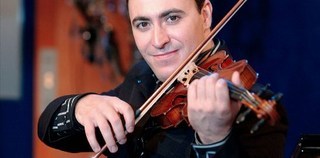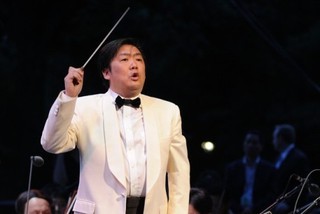|
Back
Third Time Lucky New York
Avery Fisher Hall, Lincoln Center
01/22/2015 - & January 23, 24, 2015
Pyotr Ilyich Tchaikovsky: Violin Concerto in D Major, Opus 35
Dmitri Shostakovich: Symphony No. 5 in D Minor, Opus 47
Maxim Vengerov (Violin)
New York Philharmonic Orchestra, Long Yu (Conductor)

M. Vengerov (© Courtesy of the Artist)
Three out of the last four nights, Avery Fisher Hall has hosted a trio of exceptional violinists, playing three of the most popular concertos in the repertory. Only one fiddler, Maxim Vengerov had the artistry and fiery Slavic temperament to make his warhorse, the Tchaikovsky Violin Concerto breathe and gallop actually live.
Mr. Vengerov’s history has not been the brightest one. A virtuoso who has been winning prizes since the age of 10, he suffered a broken shoulder about three years ago, putting him out of circulation. That, though, gave him a chance to study conducting, and today his work with the baton is as much in demand as his work as a soloist.
What he thought of last night’s conductor Long Yu, who has a kind of monopoly on Chinese orchestras, is unsaid. I doubt if he paid much attention to Mr. Yu, which was a wise decision. The conductor made no really bad decisions with his soloist of the evening, but the New York Philharmonic did not sound at its best. Winds, strings, brass did their part well enough, but Mr. Yu simply cued them in and made no attempts at framing the soloist or giving him more than minimal support.
And in the final movement, Mr. Vengerov, like the thoroughbred he is, simply pulled ahead of the pack. Had the orchestra simply disappeared (as they did for a gorgeous Bach encore), he would have sounded better.
Yet one could easily ignore Mr.Yu and the Phil, for from the very first opening sweep of the bow, he was in charge. The luster of his Stradivarius was more apparent in the pianissimo passages that the bravura lines, but his phrasing, the jumps of the cadenza (with an exquisite solo flute at the end) and all the passages in this opening showed a triumphant Russian artist at work.
If the orchestra was irrelevant in this opening, they did have their moments in the Canzonetta, the one chance for subtlety, where the Phil strings were eloquent enough for Mr. Vengerov’s Stradivarius.
That finale, though, was a strange association. Mr. Vengerov played it as rapidly as humanly possible, giving little heed to Mr. Yu. Not every phrase went unsmudged by the soloist, but clarity was not as important as the supersonic motion. From his first leap into the Gypsy dance, the double-stopping, the extreme changes of tempo, and the very force of his presence, it added up to an unconcealed joy.

L. Yu (© Zimbio)
Conductor Long Yu, coming from a famed musical family, was educated in both China and Germany. But the most blatant influence in Chinese music until fairly recently, was the Soviet Union. Composers, instrumentalists and conductors went to Moscow and (then) Leningrad for their training.
The result, as I discovered in Hong Kong, when Chinese composers would exhibit their wares, were basically variations on the Shostakovich Festival Overture, with Chinese melodies in between the brass fanfares.
Obviously Mr. Yu was influenced here, and his Fifth Symphony was a decent unfussy, dextrous performance. It takes another sort of genius to keep that first movement taut and unified, but Mr. Yu gave each separate section its own power. Nor did the scherzo have that special Shostakovich mordant humor, resembling instead a troubled waltz. But the slow movement gave vent to some lovely Soviet-styled hard-string playing, and the finale had a fast and sometimes wicked aggression.
Still, the evening belonged to Maxim Vengerov. Tonight, the fourth of the violin-week artists, Gidon Kremer, performs Mozart, Schubert and the (sadly) rare Moisei Weinberg. That should be fascinating indeed.
Harry Rolnick
|